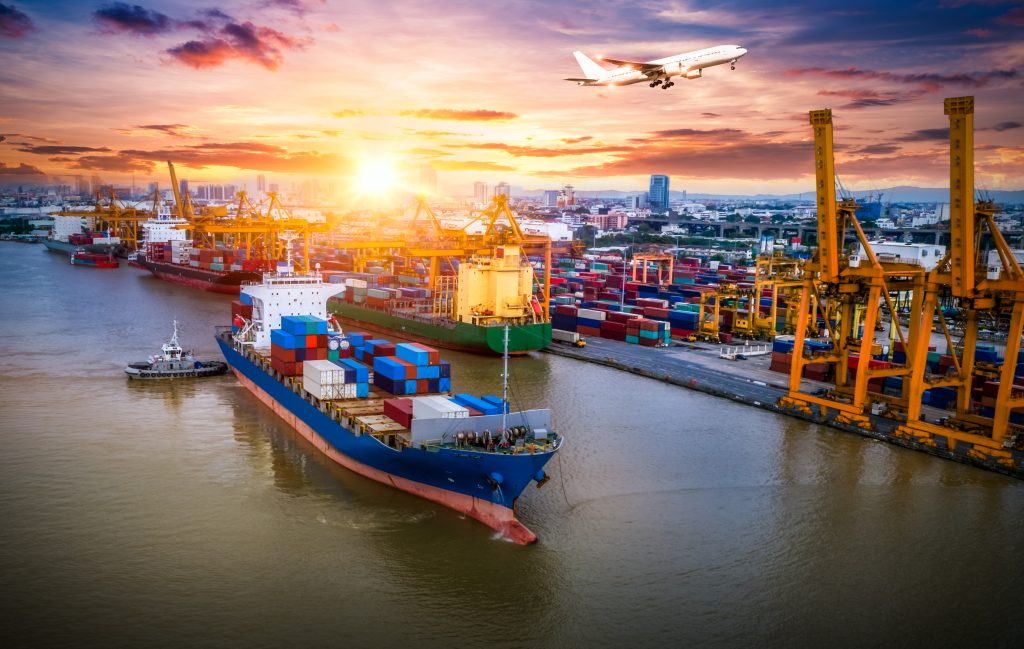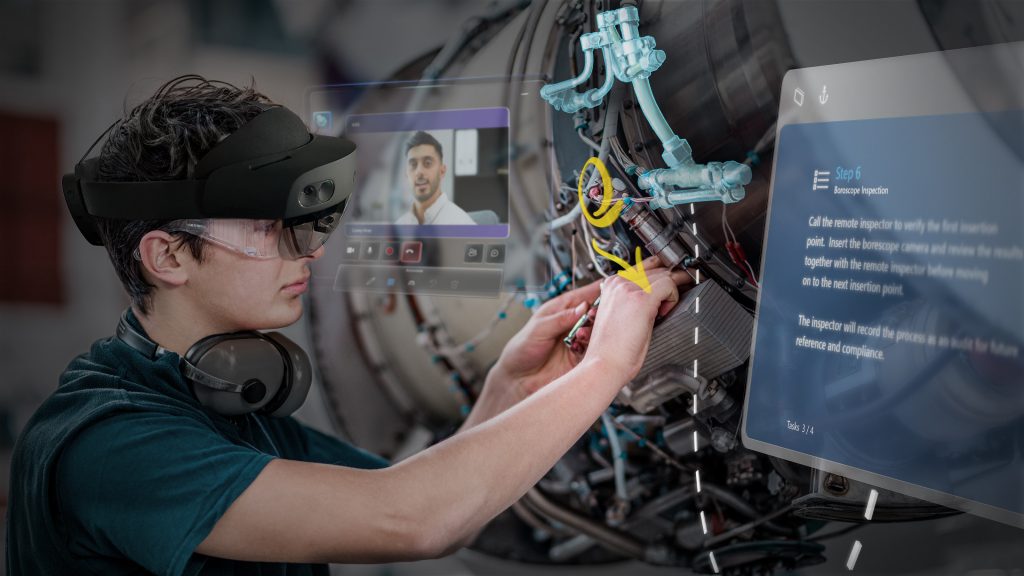
The future of manufacturing is now: Four trends shaping the industry
At its core, manufacturing is about innovation, as it builds economic capacity, bolsters workforces, and generates opportunity and growth. Today we’re seeing the industry undergo a once-in-a-century transformation driven by changing consumer demands, labor challenges, supply chain disruptions, technological advancements and sustainability demands. We’ve come a long way since the industrial revolution, and the industry has evolved into a much more complex place.
To explore these challenges and opportunities, we’ll join global leaders and colleagues at the world’s biggest trade show for industrial technology, Hannover Messe. As we enter this week of innovation, we’re discussing four key areas that are reshaping the future of manufacturing: empowering a connected workforce, fueling intelligent engineering and factories with the industrial metaverse, building agile supply chains and accelerating sustainability. Powering these trends is artificial intelligence (AI), which offers more potential for our industry than anything we’ve ever experienced, and we are just scratching the surface of what’s possible.
Here we explore how Microsoft brings these four trends to life to advance the industry:
Empowering the connected workforce
To support intelligent factories, a connected workforce is key, and of frontline manufacturing workers are excited about the job opportunities that technology creates. From the front office to the factory floor, Microsoft solutions can improve operations by streamlining daily work, driving efficiency, safety and productivity as well as helping foster an engaged workforce.
We’re building solutions to address the unique challenges manufacturers face — by helping streamline frontline operations, enhance communication and collaboration, improve the employee experience and strengthen security across shared devices.
Today, we are sharing new capabilities and updates for the workforce, including:
- The native integration of AI-empowered Power Virtual Agents (PVA) into Power Apps is now in public preview. AI-infused virtual agents will be readily available in Power Apps, allowing frontline manufacturing workers to easily find intelligent answers within the context of their manufacturing applications.
- Leverage Teams as your calling solution to connect with teammates, customers and suppliers. Later this year, factory floor employees will be able to make and receive calls through shared mobile Android phones from wherever their work takes them.
To learn more about how we’re empowering today’s manufacturing workforce, read the latest Microsoft 365 Blog.
Building resilient and agile supply chains
Supply chain disruption is not new; however, its complexity and the rate of change are outpacing organizations’ ability to address issues. Manufacturers are under pressure to prevent and minimize disruptions, and as a result, almost 90 percent of supply chain professionals plan to invest in ways to make their supply chains more resilient.
To support our customers, Microsoft offers solutions like Supply Chain Platform and Supply Chain Center, which enable organizations to reduce risk across complex supply chains and provide a ready-made “command center,” allowing organizations, such as Kraft Heinz, to meet their unique needs without replacing current systems. Additionally, Microsoft Dynamics 365 Copilot gives businesses real-time predictive insights using generative AI across materials, inventory, distribution network and more, which means potential disruptions can be avoided before they happen.
Today, Microsoft is working with customers to improve their supply chain resilience. Semiconductor company STMicroelectronics transformed their supply chain, advanced research and development, and scaled manufacturing leveraging Microsoft Azure HPC. They are now able to bring their products to market faster, and double their capacity by 2025, while becoming carbon neutral by 2027. Toyota Material Handling Europe is bringing warehouse automation to Dynamics 365 Supply Chain Management, with autonomous guided vehicles that can perform repetitive tasks quickly and accurately, leading to increased efficiency and productivity. This robotics technology can help manage inventory levels, resulting in better stock control and reduced carrying costs.
Learn more about our supply chain solutions from the Dynamics365 team in this blog.

People and AI working together: The next generation of intelligent engineering and factories with the industrial metaverse
One of the most significant changes in manufacturing has been the rise of intelligent factories. Imagine an industrial ecosystem connected to a common virtual space that allows everyone to visualize and interact with complex processes in real-time, with real-world data. The industrial metaverse, built with foundational technology like AI, Digital Twins, Mixed Reality, ML and Cloud-To-Edge is changing how companies run and manage their business by delivering immediate value through remote operations and skilling, AI process and asset optimization and robotics, automation, and autonomous operations.
Similarly, the Industrial Metaverse is creating new opportunities to make product engineering more collaborative and immersive. This enables manufacturing companies to reduce and accelerate time-to-market in an increasingly competitive environment.
Our commitment to immersive experiences that support manufacturers and frontline workers continues with today’s announcement that we’re bringing Windows 11 to HoloLens 2, enhancing security and offering the latest tools for developers. We’re also launching new updates to Dynamics 365 Guides, including the ability to annotate anything within arm’s reach, a custom security feature called “Restricted Mode” that gives organizations more control over their mixed reality apps and new updates to Teams calling within Guides to enhance the user experience.
Siemens is using generative AI to help industrial companies drive innovation and efficiency across the design, engineering, manufacturing and operational lifecycle of products. It will bring a Teamcenter app to Microsoft Teams that leverages the language models in Azure OpenAI Service to enhance cross-functional collaboration. In addition, at Hannover Messe we are demonstrating how an Azure AI Service powered assistant can augment the creation, optimization and debugging of code in software for factory automation, and how we can use industrial AI to enable visual quality inspection on the shop floor. Rockwell is integrating robotics and AI technologies to empower companies to optimize their field service workers and asset management in factories. NVIDIA’s Omniverse Cloud makes it easy for teams, from design and engineering to frontline workers, to digitize their workflows, from building digital twins of factories to running closed-loop simulations.

Sustainability, energy optimization and fuel cell innovation are more important than ever
Sustainability is a top priority for manufacturers who are adopting eco-friendly practices and implementing initiatives, such as using renewable energy sources, adopting circular economy principles to reduce waste and optimizing production processes to minimize environmental impact.
Through our technology like the Microsoft Cloud for Sustainability and our rich partner ecosystem, we are building a critical foundation for an energy efficient and sustainable future. This week, Seeq Corporation announced the Seeq Solution for Microsoft Sustainability Manager, which enables teams to integrate time series process data preparation, analysis and continuous improvement, reducing the environmental impact of process industry operations.
Many of society’s hardest sustainability problems are chemistry and materials science problems that will ultimately require a scaled quantum machine to solve. However, given the continuous increases in classical computing capabilities, more quantum chemistry problems can be solved today using state-of-the-art cloud services. Johnson Matthey, a global leader in sustainable technologies, has teamed-up with Microsoft’s Azure Quantum chemists to develop new predictive modeling tools with the supercomputing capabilities of Azure HPC and refined workflows to accelerate chemical simulations, explore the potential of AI and get quantum ready.
Many manufacturers are facing the urgent situation of rising energy costs on the factory floor and the production plant, which is why we’re working with partners and customers to prioritize top use cases that will help manufacturers gain visibility into where energy loss is occurring and triage the issue through targeted assessments.
These are some of the exciting innovations happening today to help us build a stronger, more resilient and more sustainable tomorrow.
I look forward to seeing many of you at Hannover Messe next week.